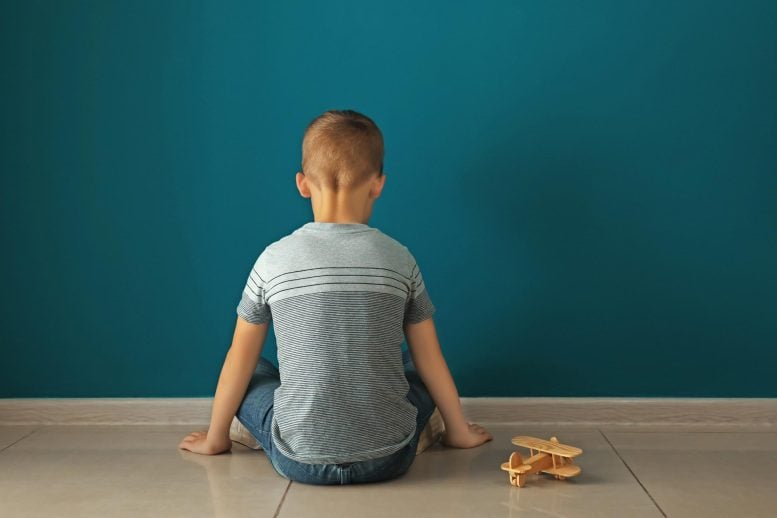Summary of Mother’s Childhood Trauma May Worsen Child’s Autism or ADHD, Study Finds:
A study by the University of Gothenburg suggests that children with neurodevelopmental disorders like ADHD and autism are more adversely affected by their mothers’ traumatic childhood experiences than by their fathers’. This research underscores the importance of providing holistic family support to address these impacts. The findings advocate for broader strategies to support families dealing with these challenges, considering the significant influence of maternal history on children’s development.
*****
Summary Bullet Points:
- Recent research has highlighted the potential exacerbation of neurodevelopmental disorders such as ADHD and autism in children due to their mothers’ childhood traumas.
- Fathers’ traumatic experiences have less impact compared to mothers’ when it comes to their children’s conditions.
- Researchers emphasize the need for a comprehensive, holistic approach to family support, taking parental histories into account.
- The study advocates for addressing the roots of trauma to mitigate its cascading effects across generations.
In the grand tapestry of human life, each thread is woven from a multitude of experiences, some vibrant and joyous, others shadowed and challenging. It’s a delicate interplay, a complex matrix of emotions, genetics, and environment that shapes who we are. Now, imagine, if you will, a new study that delves into this complex web, focused not on the present we live in, but the pasts we inherit and how these stories echo across generations.
The University of Gothenburg has recently unveiled striking research shedding light on the nuanced dynamics of childhood, trauma, and neurodevelopment. This revelation unveils the haunting whispers of mothers’ childhood experiences and their potential amplification of conditions like ADHD and autism in their children. An intricate dance between past and present, this discovery pushes us to embrace a more holistic, family-centered approach to understanding and supporting children with neurodevelopmental disorders.
Picture a mother’s childhood as a canvas marked with varying strokes—some bold, some gently faded, some sharp, and some shadowed. It’s these shadowed strokes, the scars of trauma, that researchers have started to unravel in relation to her child’s neurodevelopmental health. The study strongly indicates that the echoes of a mother’s challenging childhood resonate more profoundly in shaping her child’s mental and developmental health than the father’s.
"But why?" you might wonder, as you sip your coffee at the kitchen table, intrigued yet puzzled by this notion. Why is the mother’s history so pivotal here?
This phenomenon might be intricately tied to the ever-entwined nature of maternal instincts and emotional connectivity. Whatever the underlying reasons, the impact is clear and profound. A past marred by trauma can be an unseen hand, nudging and molding the developmental journey of their offspring, especially in cases of autism and ADHD.
Children with ADHD and autism already navigate unique challenges, and understanding the role of maternal trauma adds another layer to the already intricate puzzle. It’s vital then, more than ever, to view this through a lens not just of personal development, but holistic family dynamics. So, where do we go from here?
Imagine entering a room full of stories, whispers of the past echoing the journey of the present. You hear tales of resilience amidst adversity, the enigmatic juxtaposition of strength and vulnerability. Embracing this perspective—that of stories intertwined across generations—can be transformative. It’s not just about identifying the trauma but understanding its profound ripples, echoing onward.
Family therapy gains new lenses through this research, hinting at an integrated support mechanism not just for the child, but the guardians navigating past traumas. It calls for embracing an empathetic ear, lending support not just educationally or medically but emotionally, acknowledging the labyrinth that is familial histories.
But what about fathers? In contrast, the research indicates that the father’s traumatic experiences wield less influence. Here, we find another layer of complexity—perhaps stemming from variations in caregiving roles or emotional expression. This isn’t to discount the importance of paternal history but rather to highlight the unique, nuanced pathways through which maternal experiences weave their way into a child’s developmental tapestry.
Pause with me, dear reader, and let this sit for a moment. Can you see the implications this holds? We’re beginning to realize that addressing a child’s disorder isn’t solely about targeting their present-day challenges. It’s about understanding and supporting their family’s history, their intertwined journey across time. Picture a river—long, winding, influenced by every rock, dip, and turn. The child’s path is just one part of this flowing entity.
This notion urges a call to action, to build bridges of understanding and support systems that encompass not only the present challenges but their familial undercurrents. If you’re working with children displaying these conditions, consider this perspective shift. Understand their family’s story. Engage with their past. Inspire holistic healing.
In this landscape, health professionals, educators, and caregivers step forward as guides—but with broader maps. Imagine designing programs catering to the whole family, unraveling the tapestry of history while simultaneously weaving new threads of support and resilience.
Parents, on their part, are encouraged to embark on a journey of introspection and healing. It’s an invitation to delve into their own histories, to confront past shadows and allow transformation through understanding and therapy. For one’s own growth is intricately connected to another’s development. Support groups focusing on multigenerational healing could form pivotal platforms—a collective journey towards empowered parenting and flourish.
By reading these words, you’re already on a path toward greater understanding and enlightenment. Knowledge is powerful, transformative. It’s more than just facts and figures; it unveils the world in vibrant hues, encouraging change, growth, and understanding. When we view each family’s story as a tapestry, richly colored by their unique experiences, the result is a beautifully interconnected ecosystem, bound by shared healing and growth.
Here then lies a simple truth—understanding and confronting one’s own histories isn’t just an act of introspection, it’s a gift to your children and their future. It’s shining a light on shadows that otherwise morph and multiply in the dark. Fostering this understanding, providing comprehensive support, and moving towards healing not just for one’s self but for the family unit, paves the way for a more nurturing, accepting, and understanding world.
Let us together embark on a path—to acknowledge, understand, and heal from the echoes of the past, ensuring that the sounds of yesterday are not chains but melodies guiding the creation of a thriving tomorrow. Let’s craft a tapestry not dictated by past scars but redefined by conscious healing, support, and love—ensuring that in every stitch, the future remains bright, resilient, and hopeful.

